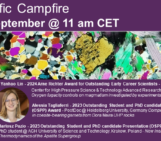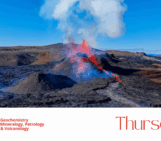
In the GMPV blog team we are a group of early career researchers (ECRs*) in their PhD or early postdoc stages. As ECRs we know that permanent positions in Academia are scarce and that we may face long postdoc careers, potentially entailing a rootless life for several years to come. In this blog, we highlight the other side of the ECR lives that fewer people know about, and that occasionally leads us ECRs to twirl until out of sync with Academia.
Most ECRs do not have open-term contracts and instead deal with fixed-term, often also short-term work contracts. The succession of postdocs tends to lead to a spinning life, always on the move. A recent survey employed by the Swiss National Science Foundation (SNSF) on the working conditions of their funded researchers showed that more than 60% of their postdocs and other staff employed in research projects is unhappy with the duration of their short contracts, often under 24 months. Indeed, the issue behind these short-term research contracts is a global and serious concern. These postdoctoral contracts tend to be tied to external funds obtained through research grants, and thus offering short duration employment. Quoting the OECD report on their Reducing The Precarity Of Academic Research Careers issue:
(…) as the long-term funding associated with core resource allocation has steadily been replaced by short-term project funding. Institutions tend to rest their research prowess on a few tenured star researchers that head teams populated by doctoral and postdoctoral researchers, who sustain the research endeavour.
All and all, it seems that institutions will be favouring postdoctoral contracts instead of offering permanent positions as a strategy, as it seems to be a lucrative arrangement to them. We call your attention to some postdoctoral researchers that persist on stipend-type contracts in the EU (e.g., Portugal). This illustrates well how in some countries postdoctoral work is perceived.
Now, it is becoming more common to find tenure-track or variations of this type of position in Academia (e.g., Germany, Italy, France, Portugal). These positions may be offered as fixed-term, 3+2, 3+3 or 2+2+2 years, entailing a number of tasks very similar to the ones that a permanent academic (lecturer) does: student supervision, teaching, grant applications, running fieldtrips, administrative-/institutional workload, etc. The expectations of an open-term contract at the end of these 5- to 6-years positions varies between countries, but with or without these expectations, these strategies have a huge impact on the early-career professionals. For example, there are few of these positions overall, so they are highly competitive (leaving out many excellent ECRs), commonly longer-term positions, but ECRs are constantly under a lot of pressure throughout the contract term (i.e., an academic performance marathon) and with no guarantees. At the end, when these ECRs are acquainted with the institution, leading a research project, supervising students, and managing research funding, more often than not, everything has to restart in a new institution. Some of us, at this point, leave Academia.
Why and how did we get here? Some of us ask. For some years now, the PhD graduate numbers have been steadily increasing worldwide due to some of the reforms to the Higher Education (H.E.) systems and Science and Technology policies, including those taking place in the EU. As graduate numbers increase, vacant postdoctoral and permanent jobs decrease and/or are scarcer, and the post-graduate life becomes dispiriting. The OECD found that the most serious concerns raised by academics about research precarity are the well-being of the researchers, the attractiveness of the research career, the quality of science produced and equality of the academic careers (pages 32-33 of the report). This is the highly precarious system that we (passively) continue to support. For instance, those of us that are now well within the academic culture have heard about predatory publishers/journals and/or have received a good number of requests/invitations to present/submit research work either to unknown conferences, special issues or rather unknown journals. Because of the increasing competition we are now faced with, even the best of us feels tempted at jumping on the opportunity to publish faster or accept less credited requests to review for certain journals to increase outputs/accomplishments. ECRs are more exposed to these phenomena, and, occasionally, we find ourselves at a crossroads. No one in science is winning with this.
But a far less discussed issue about the short-duration contracts and highly competitive postdoctoral life is the constant work (and life) disruptions. For some (few?) researchers that manage to have continuing fellowships or postdoctoral contracts at the same institution, this is less of an issue. Many of us, ECRs who currently have precarious positions and/or have been moving between institutions/countries, know and understand quite well how the moving impacts our lives in multiple dimensions (not all bad, of course!).
On many occasions we have heard more senior colleagues saying “mobility is key to success” or that “these short-term postdoctoral positions are great to ECRs careers” (to lessen academic inbreeding). While we personally tend to agree with these statements (if one stays too long in one place it becomes incredibly more difficult to leave, no?), it is also true that most benefits of moving between institutions (and there are many) tend to mask most of the cons. In the following, four main disadvantages, which are not frequently spoken about, are addressed in some detail: i) drop in productivity; ii) work slowdown due to the adjustments to the new working teams and environments; iii) persistence of unfinished research work; iv) issues supervising students/ability to manage research grants.
i) Drop in productivity.
The time it takes from diving into a research project and starting to publish the results varies wildly across disciplines and projects. In the GMPV areas we may often find ourselves in a position where data acquisition, handling and digestion may take more than one year. This implies that short-term projects may result in a periodic halt on research progress as the ECR is constantly put in a position where projects are left unfinished. Also, we need to consider that the timing between contracts, which may or may not be flexibly accommodated with contract extensions, may potentially result in a period of unemployment. These are highly disruptive and uncertain periods in ECRs’ lives that may last a few months to possibly years and that may potentially translate in a drop of their productivity (in comparison with longer-term contracts or open-ended positions). From Inês’ experience, in her transitional periods she felt that she lost about 3-month time of focused research work in a single year. We seldom consider all the hassles of moving between countries and the change in mindset due to these job transitions.
ii) Work slowdown.
The arrival and incorporation of a new postdoctoral researcher in a research institution is discipline-, group-, and institution-dependent, and it bears some impact on the ECR. Having left a working group where the ECR was already well-acquainted with, the arrival at a new workplace comes with new challenges. Those include getting to know the administrative wheel, learn about lab access and management, health and safety practises, new staff, new research topics in the group/institution, etc. This often means that re-starts are slow, especially if we consider the speed that the researcher had before the move. More often than not, changing institute and working group includes changes in the research topic, and this may enhance the work slowdown, as the researcher has to familiarise with the new topic and the existing literature. This leads to the problem of evaluation by metrics, and while commonly the new Principal Investigator/School Head and other close people are aware of the intricacies of research life, funding bodies or job recruitment committees need to be very objective and apply rigorously the evaluation criteria. The challenge of changing research jobs in Academia cannot be measured or evaluated.
iii) Unfinished research work.
Most of our ECR friends and colleagues mention that they are or have been working with data arising from a past research positions. Occasionally this situation may be procrastinated across several years. This is not surprising: if postdoctoral contracts last on average less than 2 years, it is likely that some of the work produced during that time frame will remain unfinished. As it is in the best interest of ECRs to finish off that work and publish it, we often, if not always, find ourselves in a position where, while finishing work from previous project(s), we also must take generous steps to starting the new one(s). This can be hard to deal with, as these work transitions are not always very smooth. Managing the expectations of all the parties involved, including the ones from the ECR, who wants to publish as much as possible, can be at times overwhelming. Again, it is difficult to evaluate how the production of ECRs has been impacted by this sort of setback by looking at a CV, track-record, or a research statement letter.
iv) issues supervising students/ability to manage research grants.
Due to the increasing PhD positions and fewer availability of postgraduate jobs, researchers are now evaluated on a number of different criteria. For instance, in some postdoctoral positions or fellowships aimed to freshly graduated PhDs and/or ECRs in their first years after the PhD, panels not only demand certain numbers in publications but also evaluate our performance on student supervisions, editorial boards/peer-reviewing, potentially managing/obtaining research funding, etc. Summing up: the bar is raising up every year. This implies that ECRs feel the need to apply for research grants as PIs and to supervise students quite early on, whilst they are on precarious work positions. This is highly demanding, especially considering that ECRs will potentially have to move institution before their student graduates. Additionally, due to peer-pressure in taking on research students, often ECRs might want to decline on the task, but end up saying yes (and getting buried by overwhelming situations at times!). For those who want to supervise students, it might be difficult for them to do it officially, based on the country. Not all H.E. teaching institutions allow fixed-term contract researchers to supervise students as main supervisor, and thus in countries like Germany, Switzerland and France there is an additional qualification to enable researchers to act as main supervisors. Occasionally, this can lead to very twisted circumstances.
Similar difficulties come with applying to research funds. Most funding agencies do not allow ECRs without a permanent position or only with short-term contracts to apply to research funding, with only a few exceptions (e.g. ERC research grants, occasionally ANR JCJC grants but with a catch**). Our perception is that this is slowly changing, and more grants are progressively becoming available to ECRs with fixed-term contracts. In cases where these ECR succeed in applying and obtaining research grants, at times it might be very difficult of taking the grant with them, in case they find a position in a different country:
Grant transfer requests to an organisation not based in the UK may be allowed through the Money Follows Researcher scheme if the receiving organisation is in an eligible European country. (UKRI)
AAPG 2023 is open to all grant-holding researchers belonging to an organisation, establishment or public or private research laboratory eligible for ANR funding. (ANR, France)
With research grants lasting on average between 3 and 5 years, we would need matching ECR contract durations to enable these to apply. Due to the very competitive nature of these calls (success rates anywhere between 5 and 15% on average), it will take persistence and training to have a good research idea and to write a good proposal. This is a very ambitious prospect when the ECR also needs to think about the next job and where to live next.
Despite these difficulties, very talented ECRs manage to apply and obtain research funds. We would like to illustrate a different difficulty that they may be faced with. We refer to cases where ECRs are manipulated by their group leader when applying for external funds as PI of a project (with the group leader as co-PI), to allocate the funds for hiring a PhD student to the co-PI (the group leader) under the premise that the ECRs don’t have the Habilitation*** and therefore the PhD-related funds must be managed by the Professor. Since these are University policies (i.e., holding the Habilitation) and not the funding agencies policies, this is clearly misconstrued and can have a negative impact on the ECR career. When these ECRs move to the next academic position and they are entitled to bring the funded project (as PIs) with them to the new Institution (if within the same country or in a “partner” country), they are forced to leave the PhD student behind, as those funds are officially allocated to the “co-applicant Professor”. This is a spot-on example of how ECRs’ work and working situation can be taken advantage of.
But, hey! There are many advantages of moving around as an ECR. These include getting to know more people in your field of expertise, having the opportunity to learn different techniques, discuss the same topics from new perspectives, being exposed to different research cultures, learning about H.E. and Research management schemes from different countries and institutions, etc. It is also significantly important for institutes and universities to partake in the growth of these ECRs and constantly be challenged by new and potentially different perspectives. But how are we addressing their needs? How can we combine the solutions offered by governments and institutions with a better outcome for ECRs and Science advancement?
We do not hold the answers but, potentially, a significant restructuring of the academic system in many countries is required, especially targeting the heavily hierarchical pyramid-type of faculty structure (e.g., Germany, Switzerland), that could be gradually replaced by a flatter structure (e.g., USA). To foster more transparency in research funds management, we could envisage creating positions for personnel that can overview Professors’ and researchers’ research financing (where it doesn’t exist yet). As for ECR careers, creating more tenure-track positions that can lead to Associate Professor/Senior Lecturer positions may be a good example of how the re-structuring may take place. Italy is moving forward in this direction, with the introduction of the tenure-track position together with the new law of public employment. Tenure-track positions give more stability to ECRs and allow them to grow as researchers and group leaders. But the rules need to be set out in a very transparent way, to avoid biased recruitment and unfair evaluation processes, to minimise unrealistic targets and the undesired stress that goes with it. Government policies need to be very clear about their intentions about permanent recruitment from tenure-track positions, in close coordination with the implicated H.E. institutions (regarding the funding required for hiring those academics). Considering that the ultimate argument from institutions and permanent staff is that mobility is good for the research culture, perhaps these tenure-track position towards professorship can be coupled with more pro-active (and potentially mandatory) scientific collaborations and co-supervisions between national and international institution. Potentially, temporary research mobility periods during which the researcher is required to visit other institutions can be introduced, to foster and maintain that dynamic scientific cultural exchange needed to continuously advance scientific development.
How has your ECR experience been so far? Are you feeling out of sync with Academia? Are you seeing any of these changes in your institutes and countries? What are your thoughts about the prospects of this new generation of ECR? Share your views and experiences with us.
Inês Pereira1 and Silvia Volante2
1. Research Fellow at the Geoscience Center, Earth Science Department, University of Coimbra, Portugal
2. Postdoctoral researcher at the Institute of Geology, Mineralogy, and Geophysics, Ruhr-Universität Bochum, Germany
*Early-career researcher definition vary wildly in the literature. The most common definition applies a threshold of 10 years since PhD graduation, but in some places PhD researchers are also considered ECR. For example, in the UK now we can find ECR structured into three levels: doctoral, immediately postdoctoral and transitioning to independent researchers (ukri.org).
**Because the PI salary is not an eligible cost, the ECR needs to secure the salary is covered by the host institution using independent funding from the ANR JCJC grant. Not all institutions may have research funding to cover the ECR salary, and thus not all ECR may be able to apply.
***Habilitation is the highest university degree, or the procedure by which it is achieved, in many European countries. The candidate fulfils a university’s set criteria of excellence in research, teaching, and further education, usually including a dissertation.
If you liked this post, you may also find these additional references interesting:
Herschberg, C., Benschop, Y., van den Brink, M. 2018. Precarious postdocs: A comparative study on recruitment and selection of early-career researchers. Scandinavian Journal of Management, 34(4): 303-310. https://doi.org/10.1016/j.scaman.2018.10.001
Rawat, S. and Meena, S. 2014. Publish or perish: Where are we heading? Journal of Research in Medical Sciences, 19(2): 87-89. https://www.ncbi.nlm.nih.gov/pmc/articles/PMC3999612/
Arslan, F.N., Barlett, M. 2020. Work-Life balance: A perspective from Early Career Researchers. Blog post on ecrLife. https://ecrlife.org/work-life-balance-the-voices-of-early-career-researchers/





Tamara Fletcher
This is well said. So often the cons of ‘mobility’ are ignored – often by people who have never had to move their families between countries multiple times while on low wages. The administrative burden on non-residents grows even larger for those moving between countries outside the EU, the lack of social support from constant moves, the time spent writing applications and not doing your current research. This doesn’t lead to good research and loses many of the best researchers to other sectors when enough is enough.
Teknik Telekomunikasi
What are the expectations for obtaining an open-term contract after the initial tenure-track period?